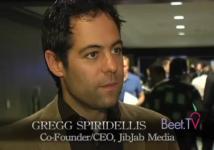
Scott Kirsner here… long-time fan of Beet.TV, first-time guest blogger. Like Andy, I’ve been following the evolution of online video as an incredibly powerful new distribution channel for content, writing in the Boston Globe, Variety, the NY Times, and on my own blog, CinemaTech.
I’ve spent the past 18 months talking to content creators about how they are navigating this new landscape, where video has suddenly become free to create and distribute. If you’re a talented filmmaker, documentarian, animator, or vlogger, how do you actually earn a living in this incredibly noisy environment?
In a book that has just been published, I collect interviews with 30 of the creative innovators who’ve been trying to answer that question: people like “What the Buck” star Michael Buckley, the animators behind “Homestar Runner” and “Red vs. Blue,” and documentarians like Robert Greenwald, who’s now working on a project about the war in Afghanistan and releasing parts of it on YouTube before it’s complete. The book is called Fans, Friends & Followers: Building an Audience and a Creative Career in the Digital Age.
Two of the people who’ve been pioneering this new kind of audience-building (and testing new business models) are Gregg and Evan Spiridellis of JibJab Media, founded a decade ago. In particular, they were early in their attempts to make ad-supported content work, and then moving away from advertising toward a subscription-based business model.
I asked Andy if he’d bring back a video he shot with Gregg Spiridellis (he’s the business-oriented sibling, while Evan oversees creative) to accompany an exclusive excerpt from the book. (The video was originally published on Beet.TV last June.)
* * *
Gregg Spiridellis: At first, we thought that
advertising would be the way we’d go. But the more we looked at that, we
realized that even if every video we made reached five million people, which is
a baseline for us – “Time for Some Campaigning” is over 15 million now – that
would generate $100,000 in ad revenue in the best case. And we’re spending
about $75,000 to make the videos. Where’s the profit, where’s the scale?
Evan Spiridellis: And if you even have a
near-miss instead of a real hit, you’re in the red.
GS: In 2006, we came to the
realization that an ad model wasn’t going to cut it. We’d taken venture capital
money at that point.
We happened to look at
American Greetings’ financials. They’re a public company. They have an $85
million business in online greeting cards. We said, “This is content. We do
content.”
But Evan said, “There’s no
f***ing way I’m making JibJab an e-card company.”
ES: But just because the bar was
so low with e-cards didn’t mean it had to stay there.
GS: We felt we could create new
expectations, new formats.
ES: And we’re also innovating our
production model, creating a virtual studio. We look at blogs, and see that
talent is everywhere. We might find a great writer in New York, and a voice guy
in San Francisco, and an artist in Italy. Our job is to pull together these
creative SWAT teams. A two or three or four-person team can produce great
content, and they share in the revenue that gets generated by that content.
GS: The idea that we’re going to
hit some sort of steady model is a false hope. You’ve just got to keep moving.
We’ve had forty business models in ten years. I don’t see it slowing down at
all.
ES: We had pitched a feature
film to a major studio, right before we raised venture capital money. It was
green-lit. But we were asking ourselves, “Do we want to go forward and be Evan
and Gregg, these two creators working with a studio, or do we want to build
something bigger, like a Disney or a Henson?”
We are just fiercely
independent guys. You take studio money, and as much as they love you, you’re
working for somebody. If they say, “Make those purple shoes red,” well, you’ve
got a boss. And with JibJab, we got used to going directly to our audience.
GS: We innovate, we produce, we
release, we get the response. The idea of spending two or three years on one
thing, and not knowing how much support it would get when it was released – it
just didn’t feel like the right time.
(Excerpted from the book Fans, Friends & Followers, by Scott Kirsner.)
Scott Kirsner, Guest Blogger
Editor’s Note: It is with great pleasure to welcome Scott as a contributor to Beet.TV. He is one of the most astute observers of the digital media world and I am flattered he is contributing here.
Andy Plesser, Executive Producer and Founder


























